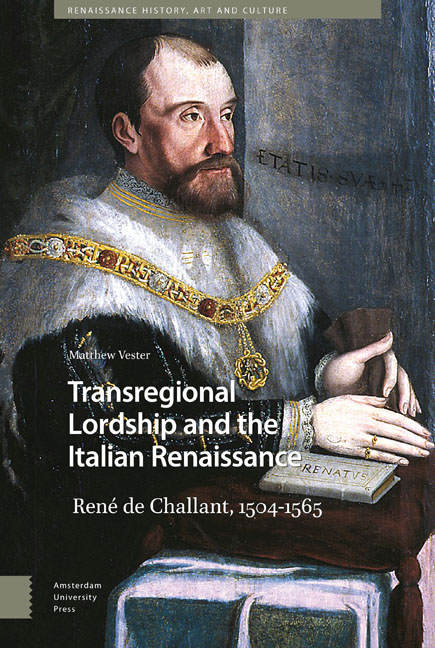Book contents
- Frontmatter
- Contents
- Maps and Tables
- Abbreviations
- Acknowledgments
- 1 On the edge of the Italian Renaissance
- 2 René's early career to 1536
- 3 René's growing influence during the war years, 1536-1553
- 4 René and Duke Emanuel Filibert
- 5 Kinship and noble life
- 6 The Challant political networks
- 7 Finance and brokerage
- 8 Lordship
- 9 The embodiment of spatial politics
- About the author
- Index
7 - Finance and brokerage
Published online by Cambridge University Press: 21 November 2020
- Frontmatter
- Contents
- Maps and Tables
- Abbreviations
- Acknowledgments
- 1 On the edge of the Italian Renaissance
- 2 René's early career to 1536
- 3 René's growing influence during the war years, 1536-1553
- 4 René and Duke Emanuel Filibert
- 5 Kinship and noble life
- 6 The Challant political networks
- 7 Finance and brokerage
- 8 Lordship
- 9 The embodiment of spatial politics
- About the author
- Index
Summary
Abstract
René's influence was rooted in his role as a financial broker, which was based, in turn, on his role as a transregional lord. Borrowing money, whether for himself or for others, depended on the lands and rights that he could offer as collateral. The attractiveness of this collateral depended on whether potential lenders saw benefits in acquiring it. The spatial situation of René's lands (and their productivity) with respect to the location of various lenders was thus crucial, as were his personal relationships with various Swiss creditors. René instrumentalized his landed position and became a key financial broker for the House of Savoy and others. His two imprisonments seriously harmed his financial position, but he eventually recovered.
Key words: finance, loans, Swiss, ransom
Nobles and finance
Recent studies of the nobility have argued, based partly on assessments of their strong financial position, that this social group remained socially and politically influential during the early modern period. While it is true that there is a paucity of records that might offer a clear picture of nobles’ financial status, documentation of noble borrowing, or sales of seigniories, ‘does not necessarily mean that a noble lineage was on the verge of bankruptcy’. Noble revenue streams were often diverse (including non-landed investments and office-holding). In late medieval Franconia, the financial strength of the nobles led princes to grant them governorships in exchange for loans. Holders of such Pfandschaften might even include princely debt as part of their daughters’ dowries, thereby binding their heirs to the princely state over which they could continue to exert significant influence. The active engagement of the early modern nobility in financial activities naturally extended into other dimensions of their lives. In France, nobles ‘used complex investment and fiscal strategies to manage large monetary fortunes’, navigating exchange rates, making investments, engaging in commerce, and borrowing from and lending to clients, other nobles, and the Crown. Marriage strategy and kin relations included important financial components. Heads of families assumed debt in order to provide dowries for daughters, and they also ‘depended on the financial support and decision making of their allies, and especially on the contributions of “houses” that had died out’. Language relating to finance also colored relationships between nobles.
- Type
- Chapter
- Information
- Transregional Lordship and the Italian RenaissanceRené de Challant, 1504–1565, pp. 221 - 250Publisher: Amsterdam University PressPrint publication year: 2020



